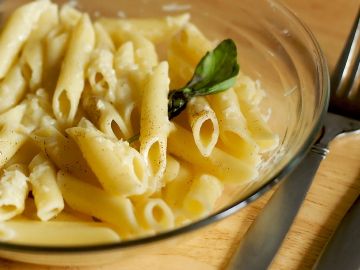
reference-image, l
(post, Savannah Naffziger)
I recently saw a magazine tabloid promoting an article titled, “Woman feeds family of five on $10 a week. Find out how!” I am not that woman. I will probably never be that woman; I have neither the ability nor the desire to eat on $10 a week. But in my life as a foodie disguised as a college student, I've learned a few lessons about shopping and eating on a budget. Know how to spend your money. A small budget doesn’t go far, but there are ways to make it go farther. First off, avoid prepared and excessively packaged food. It’s called “value-added” for a reason. In effect, you’re paying other people to do the relatively quick and easy tasks of chopping, stirring, and setting on a burner. My rule is that if I’m not hungry enough to cook, I’m probably not very hungry in the first place. [%image reference-image float=left width=400 caption="Good-quality pasta with Parmesan and garlic can be dinner."] If you don’t already have them, teach yourself the basics of cooking. I’m not talking anything five-star, but knowing how to work with whatever’s in the kitchen instead of needing to follow a recipe will pay off. I’ve been the person who decided to make the pepper pizza exactly as I read about it, and had to buy the peppers, and the basil, and the feta, and the Parmesan, and the capers, and the pine nuts, and . . . Don’t be that person. Rudimentary cooking skills will help steer you away from packaged foods, and you’ll only get better as you go along. Having the skills to improvise with what’s in the kitchen also means you won’t waste what you’ve already bought. On that same issue, don’t fall into the trap of thinking that eating well has to mean complex “gourmet” dishes at every meal. Some of the best and most delicious things you will eat are the simplest: in-season vegetables roasted with olive oil and a smattering of salt, a perfect piece of fruit eaten fresh, or good-quality pasta with only Parmesan and pepper. If these don’t satisfy you, make sure you’re buying quality products. If they still don’t, keep trying and wait for your tastes to change. You don’t need most of the drinks you’re buying. If you’re buying water, take that money and buy a good filter for your faucet instead. Juice doesn’t have nearly the same nutritional benefits as eating the equivalent piece of fruit, and soda has absolutely nothing going for it. I will stand by coffee and the occasional six-pack of beer or bottle of wine, but beyond that, buying liquids is a waste of money. Find a store with a good bulk section. Spices are key for tasty food, but they go stale quickly and usually come in huge bottles that can’t be used up for years. Bulk spices can be bought by the 1/8 teaspoon or by the cup, so you can try new things and get only as much as you need. Bulk sections can also provide precise amounts of other foods, like nut butters and vinegars. I probably don't need ume plum vinegar often enough to justify buying an entire bottle, but being able to buy a few tablespoons in bulk at my co-op means that I can use it just when it's needed. Lastly, think about planting a low-effort garden. Some plants (lettuce, carrots, squash, beans) are easier to grow than others (peppers, broccoli, basil). When planted from seed, they will cost basically nothing, except for a few hours of your time a week. Invest also in a small windowsill herb garden, since the prices for fresh herbs are generally very high.

reference-image, l